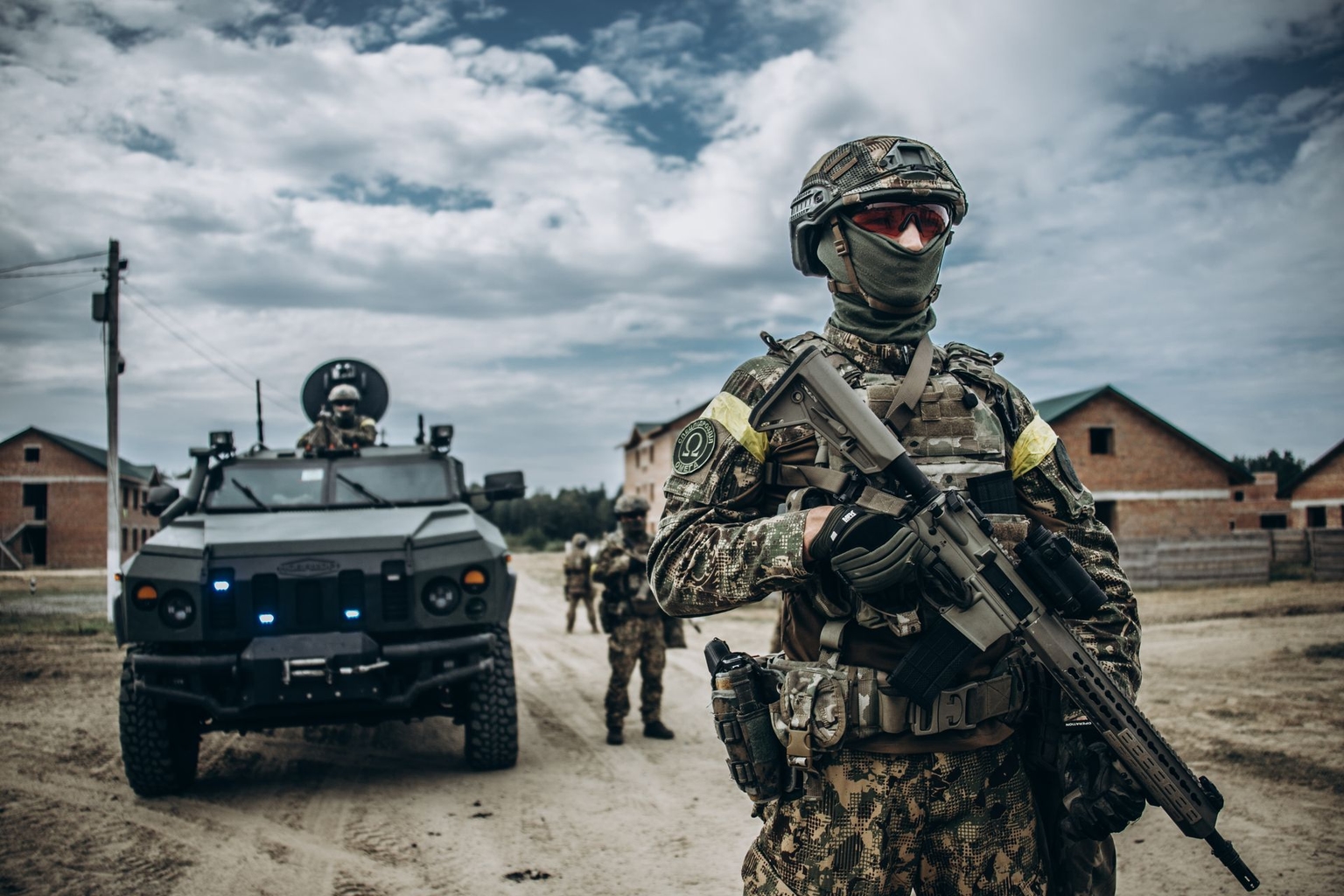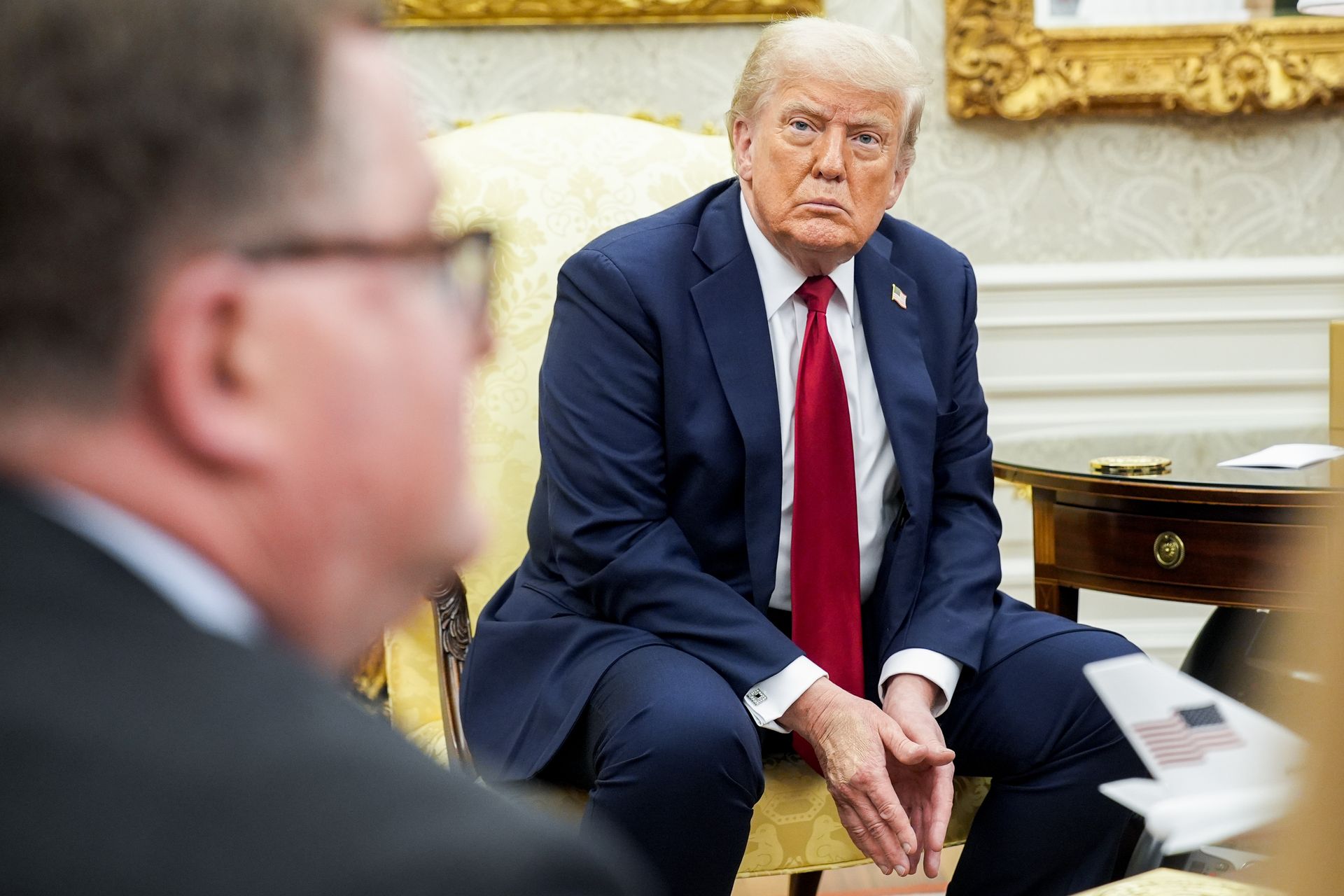Ukraine eyes building its own private military companies — their role, legal framework remain unclear
As the country faces the return of hundreds of thousands of veterans and security challenges that need to be addressed, private military companies may emerge as a potential answer.

Civilians and veterans of the Russian-Ukrainian war participate in a training game in Kyiv, Ukraine, on May 10, 2025. (Viacheslav Ratynskyi / Anadolu via Getty Images)
Russian President Vladimir Putin has laid out an ultimatum, demanding that Ukraine dissolve military formations. Kyiv responded by saying it can add more.
President Volodymyr Zelensky signaled that Ukraine might consider creating its own private military companies (PMCs).
"I will be thinking about it after these ultimatums," Zelensky said during a meeting with several media outlets, including the Kyiv Independent, back in June.
The president did not elaborate on what exactly he meant by "private formations," nor did he clarify their intended role or required legal framework.
Andrii Osadchuk, a lawmaker from the Holos party and first deputy head of the parliament's Law Enforcement Committee, said he is "cautiously positive" about the idea but calls it "abstract" at this stage.
According to the Veterans Affairs Ministry, veterans and their close family members are expected to account for a sixth of the country’s total population, or up to six million people, following the end of the ongoing war with Russia.
"On the one hand, we'll have a human resource well-suited for this kind of work. And as a society, I believe we have an interest in offering these individuals meaningful employment," Osadchuk said.
Yet, the legal framework, the government's role and supervision, as well as the scope of tasks are yet to be defined.
For the war-torn country, such a move, supporters say, could serve both domestic and foreign policy goals — from offering employment opportunities to the growing number of veterans to establishing Ukraine's presence abroad.
Those opposed, however, say that creating militarized formations that often operate in the grey area is a potential security threat for everyone involved.
'Unpopular decision'
Ukrainian law does not provide for the establishment of private military companies and prohibits the creation of paramilitary or armed formations. Still, several organizations within the country claim to be de facto PMCs and have operated in a legal gray zone.
They provide military training and security services while avoiding combat roles inside and outside Ukraine.
"Today we are working in the interests of the (Ukrainian) state… One can deny the fact of our company's existence, but it does exist," Tetiana Kebkalo, a deputy director of the Kyiv Oblast-based Omega Consulting Group, told the Kyiv Independent.
“They (the authorities) should make an unpopular decision… To bring in a private military company as a supporting tool."
Founded in 2011 and led by Andrii Kebkalo, a former French Foreign Legionnaire, Omega Consulting Group operates as a limited liability company under Ukrainian law and provides military training and security, and other services.
According to Andrii Kebkalo, from 2011 to 2022 the company primarily operated in Africa, focusing on non-combat activities. It is now active in Algeria, where it provides specialized training services, Tetiana Kebkalo said.
"They (the authorities) should make an unpopular decision… To bring in a private military company as a supporting tool," she told the Kyiv Independent.
Omega Consulting Group exists in a regulatory vacuum.

Over the past seven years, three draft laws have been aimed at legalizing military consulting and international defense firms in Ukraine, with the latest introduced in April 2024. Though framed as efforts to establish PMCs, they do not officially target the issue.
None of the draft laws have moved to the floor.
According to lawmakers who spoke with the Kyiv Independent, there's strong support for the creation of proper legislation to legalize private or government-controlled military corporations, yet consensus on the exact wording of such drafts remains elusive.
Lawmaker Fedir Venislavskyi, member of the parliament's defense and intelligence committee, told the Kyiv Independent that Ukrainian lawmakers are open to voting for a proper bill. However, some remain cautious about this move.
"The mood of the lawmakers is that (a law) needs to be adopted… But for now, there is no unity at the parliamentary level. We are working on it," he said.
Osadchuk said, "both the form and the substance are important here."
He added that private military companies can be officially established only after the war's "hot phase" concludes.
The struggle to adopt proper legislation that would pull PMCs out of the shadows isn't unique. Countries that have established PMCs often lack laws defining their work.
In the U.S., there is no single federal law that deals with private military companies. Instead, regulation is spread across multiple laws, rules, and court decisions, each covering different parts of their activities.
In the U.K., the Private Security Industry Act regulates domestic security services like guarding, but doesn't apply to PMCs working abroad, especially in combat roles. Overseas, the industry largely regulates itself through voluntary codes.
Empowering veterans, expanding Ukraine's reach
Private military companies typically handle a wide range of services.
In Ukraine, they could also offer veterans a way to continue serving after demobilization. Osadchuk sees this as a practical opportunity for former soldiers to apply their combat experience in a professional capacity and be fairly compensated for it.
"I am also looking at it from an (international) perspective. I've long believed that once we emerge from this nightmare, the vast military expertise Ukraine has gained shouldn't be wasted — it should be leveraged, even commercially," Osadchuk said.
Kebkalo suggests PMCs could take over roles such as embassy safeguarding or escorting arms shipments, tasks often managed by state forces.
"Ukraine has well-trained specialists in this field, and this is an opportunity for Ukraine to expand its sphere of influence on the African, Asian continents, and so on."
According to lawmaker Halyna Yanchenko, PMCs could become a vital reserve force for Ukraine in case of renewed Russian aggression. Also, they have the potential to generate funding by offering training and advisory support to other countries, leveraging their battlefield experience, she said.
"There is currently a global demand for the services provided by private military companies, ranging from protecting various infrastructure facilities to physical security. And the Russian Federation has been very active in this market, before the war as well," said Venislavskyi.

"So this is also a tool of international political influence for Ukraine. Ukraine has well-trained specialists in this field, and this is an opportunity for Ukraine to expand its sphere of influence on the African and Asian continents, and so on."
Lawmakers suggest that private military companies in Ukraine could be regulated by established defense structures, such as the Defense Ministry, the National Police, intelligence agencies, or the Armed Forces, without conflicting with the country's law enforcement.
The Kyiv Independent has reached out to the Defense Ministry, Interior Ministry, and intelligence agencies for comment. The Interior Ministry and the Security Service of Ukraine (SBU) denied to directly answer the provided questions while the Defense Ministry and Ukraine's military intelligence (HUR) didn't respond.
Security concerns
Speaking of private military companies, some recall the problems that emerged with security companies in Ukraine in the 1990s, many of which were controlled by oligarchs or criminal groups.
Following the start of Russia's war against Ukraine, and the subsequent fight in Donetsk and Luhansk oblasts, which showed the poor state of the country's Armed Forces, private and volunteer military formations took on a leading role in defending the country.
One of the volunteer battalions, Dnipro-1, formed under Ukraine's Interior Ministry, was backed by business groups linked to oligarch Ihor Kolomoisky.
In 2015, armed men linked to private security firms reportedly controlled by Kolomoisky, then governor of Dnipropetrovsk Oblast, raided the Kyiv headquarters of state-owned oil company Ukrnafta, in which he held a 40% stake.
Then President Petro Poroshenko condemned the incident, saying that "no governor will have his own army." At the same time, then Interior Minister Arsen Avakov ordered private security firms to disarm and operate within the law.
A more controversial example from the same year was the creation of the Tornado battalion. Its members were later accused of serious abuses, including kidnapping, torture, and rape. The unit was disbanded in 2015 following criminal investigations.
Internationally, the reputation of private military corporations has been tarnished by a series of scandals.
U.S.-based firms like Blackwater (now known as Academi) and DynCorp, as well as the U.K.'s G4S, were linked to murder, sexual misconduct, human trafficking, and other human rights violations.
The case of Russia's infamous Wagner Group stands out.
Wagner has operated in conflict zones throughout Europe, the Middle East, and Africa, torturing and murdering people across all fronts.

Wagner fighters, many recruited from Russian prisons, led the brutal nine-month push to capture Ukraine's eastern city of Bakhmut, losing an estimated 20,000 soldiers. Evidence collected by a Ukrainian NGO, Media Initiative for Human Rights (MIHR), accuses them of torture, executions, and holding captured Ukrainian POWs in inhumane conditions.
Wagner Group's downfall was fueled by escalating tensions with Russia's Defense Ministry, culminating in a failed mutiny against the state in June 2023.
Wagner's then-leaders, Yevgeny Prigozhin and Dmitry Utkin, were killed in a mysterious plane crash two months after the attempted coup.
"The Russian Federation cannot be any kind of example for us at all. It is a state that lives by criminal laws," Kebkalo said. "And if we look at the civilized world — the U.S., the U.K., France — there is not a single case where a private military company has turned its power against its own government."
"The private military company itself does not aim to overthrow the existing government in any way."
Note from the author:
Hello there! This is Kateryna Denisova, the author of this piece.
The Kyiv Independent doesn't have a wealthy owner or a paywall. Instead, we rely on readers like you to keep our journalism funded. If you liked this article, please consider joining our community today.
Thank you.










